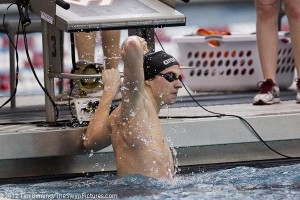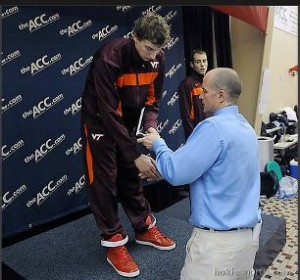By: Eric McGinnis, CSCSSports Performance Specialist, Rollins College Strength CoachSpectrum Sports Performance
Sports help teach young athletes to set goals and take appropriate actions in an attempt to achieve them. We all know that success doesn’t always come easy, but sometimes we fail to understand the true difficulty of what it takes to get there.
 My younger brother, Zach, wanted to be a great swimmer his entire life. By the time he was a freshman in high school our older brother, Matt, had a world championship gold medal and was an All-American swimmer for the University of Texas. I was a senior in high school and just signed a letter of intent to swim at the University of Kentucky. Zach wanted to be a great swimmer because his older brothers were successful swimmers and he believed he could be too. The only problem was, he was the only person who believed he could.
My younger brother, Zach, wanted to be a great swimmer his entire life. By the time he was a freshman in high school our older brother, Matt, had a world championship gold medal and was an All-American swimmer for the University of Texas. I was a senior in high school and just signed a letter of intent to swim at the University of Kentucky. Zach wanted to be a great swimmer because his older brothers were successful swimmers and he believed he could be too. The only problem was, he was the only person who believed he could.
Zach didn’t show much talent at a young age, and compared to Matt and me he lacked the size we had been blessed with. Still, his plans never changed. He wanted to go to a big Division 1 University and experience the success Matt and I had. That kind of future wasn’t looking likely, however, and things got worse when he started experiencing shoulder pain the summer after his freshman year of high school. In December of 2006 he would have his first surgery for a torn labrum, only to be followed by a second surgery a month later for tearing his other labrum.
After 2 hours per day of rehab for 6 months, Zach was ready to get back in the water by July of 2007 and he was training full time by October of 2007. He was just in time for his junior season. He would be set back, however, by an immediate back injury upon returning. By this point there were many close to him trying to convince him to quit. Not because they wanted to watch him fail, but because they were tired of watching him fail. Unwilling to change his mind he continued swimming and began strength training with a personal trainer named Barry Bragg. Barry taught Zach more than strength training. He taught him lessons about faith and believing in oneself.
After not much time back in the water, Zach was already showing quite a bit of progress. However, when recruiting time came around for colleges there wasn’t much out there for him. The University of Kentucky (where I was swimming at the time) offered Zach a small scholarship and he accepted with enthusiasm. This was considered a “polite gesture,” but to Zach it was an opportunity for him to show everyone what he was capable of.
 Fast foreword to 2012 and Zach had completed 2 college seasons having already swam faster than anyone ever thought. He transferred to Virginia Tech after his freshman year and quickly moved up the ranks in the 100 and 200-yard backstroke events in the Atlantic Coast Conference. At the ACC Championships in February of 2012, my younger brother shocked the college swimming community when he became the ACC Champion in the 100-yard backstroke with a time of 46.79. There were coaches on the pool deck for other teams that specifically told Zach he wasn’t good enough to walk on to their team just a few short years ago. Zach has turned a distant dream into reality, and this month he will compete in his first ever NCAA Championship meet in Seattle, Washington.
Fast foreword to 2012 and Zach had completed 2 college seasons having already swam faster than anyone ever thought. He transferred to Virginia Tech after his freshman year and quickly moved up the ranks in the 100 and 200-yard backstroke events in the Atlantic Coast Conference. At the ACC Championships in February of 2012, my younger brother shocked the college swimming community when he became the ACC Champion in the 100-yard backstroke with a time of 46.79. There were coaches on the pool deck for other teams that specifically told Zach he wasn’t good enough to walk on to their team just a few short years ago. Zach has turned a distant dream into reality, and this month he will compete in his first ever NCAA Championship meet in Seattle, Washington.
To me, the significance of Zach’s story goes beyond “feel good.” Too often we look at successful people on TV and think “wouldn’t it be nice.” The reality is we don’t know what it took for them to get there, or how hard they worked for it. This story wasn’t “feel good” to Zach when he was living it. He battled doubters, surgeries, and severe depression to get to where he is, and he wasn’t always making progress. I asked Zach what he would want people to take away from his story. His message: “You have to believe in yourself before anyone else will,” and “Never see limits.”
How many times did you fall down before you walked? The correct answer is, “Until I began to walk.” – Dave Tate
Edited by Courtney VandeStreek
Leave a Reply